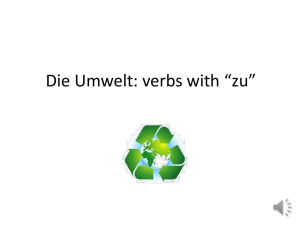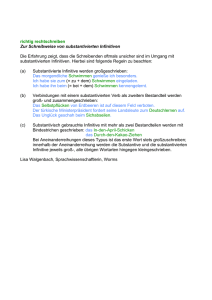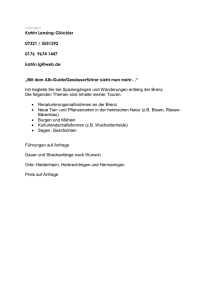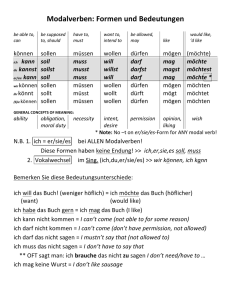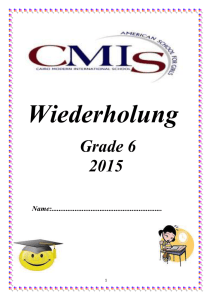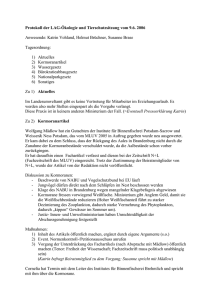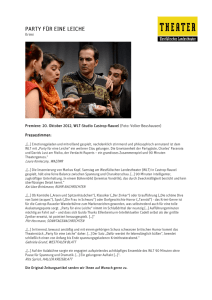GERMAN 1023 KAPITEL ACHT Modal auxiliaries Infinitive
Werbung
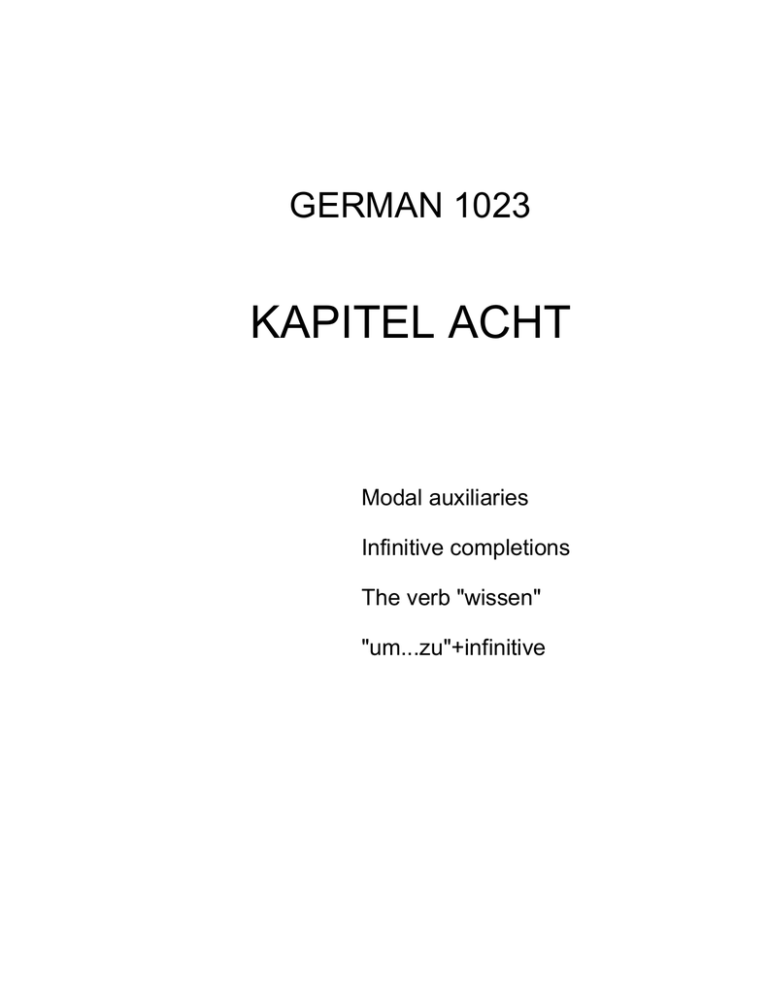
GERMAN 1023 KAPITEL ACHT Modal auxiliaries Infinitive completions The verb "wissen" "um...zu"+infinitive Essen und Trinken in Deutschland Morgen hat Lars Henkel Geburtstag. Er plant eine Party mit seinen Freunden. Heute will er die Feier vorbereiten. Er fährt zum Supermarkt. Lars muss viel für die Party einkaufen, aber er darf nicht zu viel Geld ausgeben. In dieser Woche ist Chili billig und er kauft 10 Dosen. Außerdem braucht er noch Brot, Käse und Schinken, um belegte Brote zu machen. Auch den Krautsalat darf er nicht vergessen. Er findet alles im Supermarkt. Lars muss 74 € bezahlen. Aber das Wichtigste vergisst er fast: Er muss noch Wein und Bier für seine Freunde holen! Ein Verkäufer hilft ihm. Er gibt Lars einen Kasten Bier und sagt: „Hoffentlich wird die Party gut! Viel Spaß!” 2 Eine Party in der WG Fill in the blanks with the appropriate form of the modal auxiliary in parenthesis. Sophie und ihre Mitbewohner ____________ (would like to) eine Party machen und sie ____________ (want to) alle ihre Freunde einladen. Die Party ____________ (supposed to) nächsten Freitag sein. An diesem Tag ____________ (be able to) viele Leute kommen. Die WG-Bewohner ____________ (have to) noch viel vorbereiten. Gordon, Sophies Mitbewohner, ____________ (has to) viel einkaufen, aber er ____________ (allowed to) nicht zu viel Geld ausgeben. Sie ____________ (to need) Salat, Chips, Säfte und vor allem Bier. Sophie ____________ (to like) Bier nicht. Deshalb ____________ (supposed to) Gordon auch ein paar Flaschen Wein kaufen. Sophie ____________(wants to) auch die Wohnung dekorieren. Die WG ____________ (to have) einen CD-Player und ihre Freunde ____________ (supposed to) gute CDs mitbringen. Dialog I Matthias: Hallo. Katrin: Oh hi. Tobias & Fatima: Hallo! Matthias: Was macht ihr heute Abend? Katrin: Ich weiß nicht.... Nichts. Matthias: Ich will heute meinen Geburtstag feiern und mache heute Abend eine Party. Kannst du kommen, Katrin? Katrin: Klar. Zu einer Party kann ich immer kommen. Um wie viel Uhr? Matthias: Um 8 Uhr. Und du Tobias? Fatima? Könnt ihr kommen? Tobias: Nein. Ich kann leider nicht. Matthias: Ach, schade. Tobias: Ich muss heute Abend arbeiten. Ich muss ein Buch für Englisch lesen. Morgen habe ich eine Prüfung. Und ich muss diese Woche auch noch eine Hausarbeit für Soziologie schreiben. Fatima: Aber ich kann kommen. Eigentlich soll ich nach Bremen fahren und meine Großeltern besuchen, aber das kann ich auch ein anderes Mal. 3 Dialog II: Katrin: Hi Stefan, Matthias macht eine Party. Gehst du hin? Stefan: Ja, du auch? Katrin: Ja, aber ich habe kein Auto, um hinzufahren. Mein alter Renault ist kaputt. Hast du noch den roten Golf? Stefan: Nein, der gehört mir nicht mehr. Ich fahre jetzt einen Seat. Aber ich kann dich auf jeden Fall mitnehmen. Katrin: Du kennst doch meine Freundin Nadine. Hast du auch Platz für sie? Stefan: Natürlich nehme ich sie auch mit. Wann soll ich euch abholen? Katrin: Ach, so gegen acht Uhr? Stefan: Ich komme um halb acht, um euch abzuholen. Ok? Katrin: Gut, tschüs dann, bis heute Abend. Dialog III: Katrin: Coole Party, Mann! Matthias: Hey! Möchtet ihr was trinken? Stefan: Ja, gern. Was gibt es denn zu trinken? Matthias: Es gibt Bier, Wein, Cola und Saft. Möchtet ihr ein Bier? Stefan: Ich darf nichts Alkoholisches trinken. Ich muss fahren. Matthias: Eine Cola? Stefan: Ich darf keine Cola trinken. Zuviel Zucker. Ich möchte einfach ein Wasser. Matthias: Und du, Katrin, Bier oder Cola? Katrin: Ich mag keine Cola. Ich nehme ein Bier. Matthias: Ok. Möchtet ihr etwas essen? Es gibt Pizza, Salate, Falafel, Döner, Bratwurst und Kuchen. Stefan: Katrin, soll ich dir ein Stück Pizza oder Falafel mitbringen? Katrin: Nein, danke. Pizza ist mir zu fettig. Ich hole mir etwas Salat. 4 Answer the following dialogue questions. 1. Warum macht Matthias heute Abend eine Party? ____________________________________________________________ 2. Wen lädt Matthias ein? ____________________________________________________________ 3. Warum kann Tobias nicht kommen? ____________________________________________________________ 4. Kann Fatima kommen? ____________________________________________________________ 5. Um wie viel Uhr beginnt die Party? ____________________________________________________________ 6. Was für ein Problem hat Katrin? ____________________________________________________________ 7. Wer ist Nadine? ____________________________________________________________ 8. Was für ein Auto hat Stefan? ____________________________________________________________ 9. Wann holt Stefan Nadine und Katrin ab? ____________________________________________________________ 10. Warum kommt Stefan um halb acht zu Katrin? ____________________________________________________________ 11. Warum darf Stefan nicht Alkohol trinken? ____________________________________________________________ 12. Was gibt es bei Matthias zu essen? ____________________________________________________________ 13. Was gibt es bei Matthias zu trinken? ____________________________________________________________ 14. Was isst Katrin nicht gern? ____________________________________________________________ 15. Wie ist die Party? ____________________________________________________________ 5 GRAMMATIK There are six verbs known as modal auxiliaries: können müssen sollen wollen dürfen mögen (to be able to, "can") (to have to, must) (to be supposed to, should) (to want to) (to be allowed to, may) (to like) As in English these verbs really describe what might be called an "attitude" toward another action: I want to give a party. This sentence does not say you give a party; it describes your feelings, your desire to give a party. The same in the German sentence: Ich will eine Party machen. Since these modals describe attitudes toward actions, they are usually not used alone but need a completion in the form of an infinitive. One cannot really say: "I must." alone, without some other action at least being understood: "I must work (write letters, visit my friends, etc.)". In German the infinitive completion always goes at the end of the sentence without "zu" - "to"! Er kann deinen Freund heute Abend nicht sehen. The conjugation of the modal auxiliaries differs from the regular German verb conjugation. dürfen sg. 1. 2. 3. ich du er sie es darf darfst können pl. sg. wir dürfen ihr dürft sie dürfen ich du er sie es darf (Sie dürfen) mögen 1. 2. 3. ich du er sie es mag magst pl. kann kannst wir können ihr könnt sie können kann (Sie können) müssen wir mögen ihr mögt sie mögen ich du er sie es mag (Sie mögen) 6 muss musst wir müssen ihr müsst sie müssen muss (Sie müssen) sollen sg. 1. 2. 3. ich du er sie es wollen sg. pl. soll sollst wir sollen ihr sollt sie sollen ich du er sie es soll (Sie sollen) will willst pl. wir wollen ihr wollt sie wollen will (Sie wollen) Note the vowel change in the singular (in some modals) and the missing "e" and "t" endings in the 1st and 3rd persons singular! Negative of "müssen" and "dürfen" English "must" and "have to" have the same meaning in positive sentences but not in negative ones. So there are different German equivalents. Positive: Ich muss gehen. I must go. I have to go. I may go. I'm allowed to go. Ich darf gehen. Negative: Ich muss nicht gehen. Ich darf nicht gehen. I don't have to go. I must not go. Omission of the infinitive completion with modals The infinitive completion is often omitted in sentences with a modal when the meaning of the infinitive is clear from the context. Ich kann es nicht. (I can't.) = Ich kann es nicht tun (I can't do it.) Ich muss nach Hause. (I have to go home.) = Ich muss nach Hause gehen. (I have to go home.) DO NOT CONFUSE a. “wollen” (to want to) or b. „ich will", "er, sie, es will" with the English "will" (future tense). "mögen" (to like) with "möchten" (would like) The German verb "wollen" means "to want to"! ================================================================= 7 The verb "wissen" Another verb, "wissen" (to know), - although not a modal auxiliary - is conjugated like the modals: wissen sg. pl. 1. 2. 3. ich du er sie es weiß weißt wir ihr sie wissen wisst wissen (Sie wissen) weiß Note the lack of endings on the first and third persons, singular. "wissen", "kennen" und "können" The English equivalent of both "wissen" and "kennen" is "to know"; "wissen" means to know something as a fact "kennen" means to be acquainted with a person, place or thing. "können" means "to be able to do something" Ich weiß, wer Frau Bauer ist. Ich kenne Frau Bauer gut. Ich kann sehr gut Italienisch. I know who Mrs. Bauer is. I know Mrs. Bauer well. I know Italian very well. ("kennen" was used in Middle English and is still used in Scottish. The noun "ken" means perception or understanding: "That's beyond my ken.") Other infinitive completions Modal auxiliaries are not the only verbs to take infinitive completions. Many other verbs do, too. The big difference is that almost all verbs other than the modals (and "möchten" + "würden") take the word "zu" with the infinitive: Ich versuche, deine Tasche zu finden. Es ist schwer, Japanisch zu lernen. Es ist schön, nichts machen zu müssen. (I try to find your bag.) (It is difficult to learn Japanese.) (It is nice not having to do anything.) (In the last example the modal is an infinitive completion not the main verb!) When the infinitive completion is a verb with a separable prefix, then "zu" is inserted between the prefix and the stem of the infinitive: Max versucht, die Tür aufzumachen. (Max tries to open the door.) 8 "Um ... zu" + infinitive construction The preposition "um" is used in a construction with the infinitive to express purpose (in order to). One action is done to achieve another. The infinitive is placed at the end of the sentence as usual and is always preceded by "zu"; anything else, direct objects, prepositional phrases, etc., is placed in between "um" and "zu" + infinitive (this infinitive constructions is separated from the main clause by a comma): Ich borge sein Auto, um nach Bonn zu fahren. (I borrow his car [in order] to drive to Bonn.) Oliver braucht noch Käse, um eine Pizza zu machen. (Oliver still needs cheese [in order] to make a pizza.) Seine Freundin geht zum Metzger, um Wurst zu kaufen. (His [girl-] friend goes to the butcher shop [in order] to buy cold cuts.) This construction can only be used when the subject carrying out the action of the main clause and the action in the infinitive construction are the same. Although the "um ... zu" + infinitive construction cannot stand alone separated from a main clause, in conversation it's often used without it: Warum brauchst du Harros Auto? Um nach Bonn zu fahren. (Why do you need Harro's car?) ([In order] to drive to Bonn.) "ein paar" + "einige" and "etwas" + "ein bisschen" a. The terms "ein paar" and "einige" mean "a few" or "some" and express an undefined number, more than two but not many. Möchtest du ein paar Weintrauben? Ich lade einige Freunde ein. b. (Would you like a few grapes?) (I'll invite some friends.) The meaning of "etwas" is determined by its function in a sentence. If "etwas" is used as an indefinite pronoun it refers to things and ideas and means "something". Ich muss jetzt etwas essen. (Now I have to eat something.) If "etwas" is used as an adjective preceding a noun it means "some". Möchten Sie etwas Wein? (Would you like some wine?) In this function "etwas" can be replaced by "ein bisschen" meaning "a little bit" Möchten Sie ein bisschen Wein? 9 (Would you like a little bit of wine?) ÜBUNGEN A. Fill in all the blanks with the appropriate form of the modal auxiliaries in parenthesis. 1. Ich __________ (können) morgen nicht kommen. 2. Paul __________ (sollen) seinen Eltern öfter Briefe schreiben. 3. Wir __________ (müssen) heute arbeiten. 4. Britta __________ (wollen) eine Party machen. 5. Du __________ (sollen) um 5 Uhr zu Hause sein. 6. Er __________ (dürfen) keinen Kaffee trinken. 7. __________ (mögen) Sie das deutsche Bier nicht? 8. __________ (können) ich dich nächste Woche besuchen? B. Put the two sentences together by using an UM...ZU + Infinitve-construction (leave out the modal verb in the new sentence). EXAMPLE: Torsten lernt Deutsch. Er möchte in Deutschland studieren. Torsten lernt Deutsch, um in Deutschland zu studieren. 1. Inga fährt nach Kanada. Sie möchte ihren Freund besuchen. 2. Rudolf ruft Sabine an. Er möchte sie zum Geburtstag einladen. 3. Karin und Udo joggen jeden Morgen. Sie wollen fit bleiben. 4. Wir kaufen Karten. Wir wollen die Rankin-Familie hören. 5. Mein Neffe kommt mit dem Auto. Er soll mich abholen. 6. Peter arbeitet viel. Er möchte mehr Geld haben. 10 C. Answer the questions by using an UM...ZU + Infinitive-construction. When answering in colloquial German, one can leave out the first part of the answer sentence (which only repeats the info. in the question). Example: Warum arbeitest du so viel? (viel Geld zu haben) Ich arbeite so viel, Um viel Geld zu haben. 1. Warum fährst du in die Schweiz? (meine Tante besuchen) 2. Warum kaufst du einen Porsche? (schneller fahren) 3. Warum lernst du so viel? (gute Noten bekommen) 4. Warum kaufst du Sekt? (meinen Geburtstag feiern) 5. Warum reist du nach Deutschland? (Bier trinken) 6. Warum holst du die Brille? (besser sehen können) 7. Warum brauchst du Geld? (Salat einkaufen) 8. Warum machst du viel Sport? (fit bleiben) D. Fill in all the gaps with the right forms of "wissen" or "kennen" Example: Wisst ihr, dass wir morgen einen Test schreiben? Nein, das wissen wir nicht. 1. ___________ Steffi wie spät es ist? -- Nein, sie______________es nicht. Sie hat keine Uhr. 2. Robert, ___________ du Professor Bauer? -- Ja, ich___________ihn. Er ist groß und blond. 3. Wo essen wir heute? ___________ Sie das Frau Meyer? – Ja, ich ___________das. Ich habe die Adresse. 4. ___________ Sie das Restaurant? -- Oh ja. Mein Mann und ich, wir ___________es genau. Es ist sehr gut. 5. Elsa und Frank, ___________ ihr Bryan Adams? -- Ja, natürlich ___________ wir ihn. Er ist ein Superstar. 6. Wer hat mein Auto? Uli und Inge, ___________ ihr das? – Nein, wir ___________es nicht. 11 E. Fill in the blanks with either "ein bisschen" / "etwas" / "ein paar" or "einige". 1. Hast du ______________________Zeit? 2. Ich brauche noch ______________________Geld. 3. Das Buch kostet nur ______________________Mark. 4. Ich habe Hunger. Ich möchte ______________________essen. 5. In der Flasche ist noch ______________________Wein. 6. Bringt ihr ______________________Flaschen Bier mit? 7. Wir holen ______________________Brötchen. 8. Ich kaufe ______________________Flaschen Bier. 9. Ann braucht ______________________Gläser. 10. Willst du ______________________trinken? 11. Er möchte gern ______________________Saft. 12. Wir essen ______________________Brote. F. Cope with the following situations in German. 1. Say that you have to go to Halifax tomorrow. 2. Say that Robert cannot come this evening. 3. Say that you do not like meat. 4. Ask a friend whether she is allowed to drink beer. 5. Say that you are trying to find your professor. 6. Ask Herrn Jazek whether he can play tennis. 7. Ask your friends whether they would like a coffee. 8. Say that you have to find your book. 9. Say that you are not allowed to drink alcohol. 10. Ask your friends whether they like the German film Das Boot. 11. Say it is easy to speak German. 12. Say that you are not allowed to eat nuts. Say that you have an allergy. 13. Ask Frau Kaiser whether she would like to go to the cinema. 12 G. Complete the sentences with the German equivalent of the English words in parenthesis. 1. Holst du ________________? (the children / the car / us / him) 2. Ich bringe _____________ hin. (you, fam. pl./ the students / my friend) 3. Fragst du ______________? (me / Herr and Frau Braun / us/ Jana) 4. Er antwortet _____________. (her / his girl-friend / them / his father) 5. Wolfville gefällt ____________. (my family / her brother / us / me) 6. Ich danke _______________. (you, fam. sg. / his mother / the teacher) 7. Wann kommt _____________? (Marion / my friend / Frau Weiß) 8. Vielleicht sucht er ___________? (you, fam. pl. / me / you, formal) 9. Wir brauchen ______________. (her / the sugar / you, fam. sg.) 10. Sie mögen _____________ nicht. (me / cheese / chips / you, fam. pl.) 11. Dieser Anzug passt ___________. (me / you, formal / your brother / him) 12. Ist das Geschenk für __________? (your mother / me / her sister / your pl. parents) H. Fill in the correct form of "wissen". 1. Was ________ du? 2. ________ ihr etwas von Erika? 3. Wir ________ nichts. 4. Die Studenten ________ alles. 5. Ich ________ viel. 6. Holger ________ ein wenig. 13 VOKABULAR auf jeden Fall belegte Brote in any case open sandwiches Cognates die Allergie/n der Alkohol (all types of alcohol i.e. Vodka, Whisky etc. are masc.) das Bier die Coca Cola (Coke)/s Nouns der die die das das die der die der der der die die die die die die der das der der der der der Bäcker/Bäckerei/en Brille/n Brot/e Brötchen/Feier/n Geburtstag/e Kartoffel/n Kasten Käse/Metzger/Metzgerei/en Nachricht/en Note/n Nudel/n Nuss/"sse Prüfung/en Reis Stück Saft/"e Salat/e Schlüssel/Schinken/Sekt der die die Verkäufer/Verkäuferin/nen Wurst/"e ein anderes Mal ein bisschen bis bald Part der Krautsalat das Wasser der Zucker die Party/s (or: Parties) die Salami/s Modals dürfen können mögen müssen sollen wollen baker bakery glasses bread roll celebration birthday potatoe box/crate cheese butcher butcher shop news grades, marks noodle nut examination rice piece juice salad, lettuce key ham German champagne salesman saleswoman sausage, cold cuts Verbs ab/holen ab/schneiden an/fangen besuchen beschreiben dekorieren ein/kaufen feiern hören lachen mit/nehmen schneiden versuchen vor/bereiten wissen 14 another time a little bit see you soon to be allowed to, may to be able to, "can" to like to have to, must to be supposed to, should to want to to pick s.o. up, to collect to cut off to begin to visit to describe to decorate to shop to celebrate to hear to laugh to take along to cut to try to prepare to know Other eigentlich ein bisschen einige ein paar etwas etwas fast fertig hoffentlich inzwischen klar actually a little bit of a few, some a few, some some (preceding a noun) something almost finished hopefully in the meantime clear, distinct (coll.:of course, understood) leider lieber lustig schade tschüs wann warum wichtig unfortunately prefer(comparative of: gern) funny unfortunately bye (coll.) when why important 15
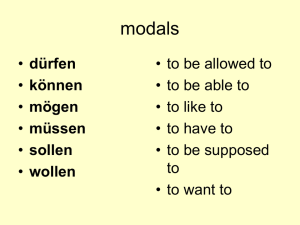
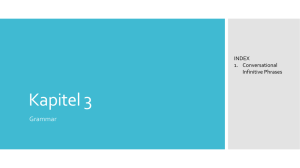
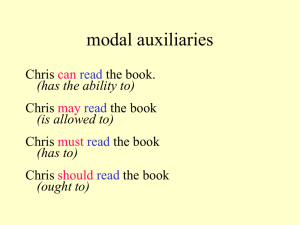
![8G_4.5.1_abenteuer_im_freien[1]](http://s1.studylibde.com/store/data/003315084_2-524b324f0a8099e1aeaba28621922d1c-300x300.png)
